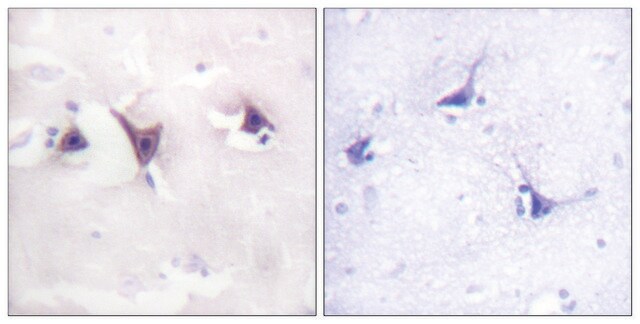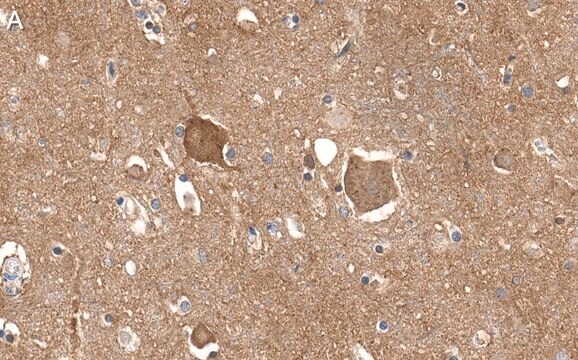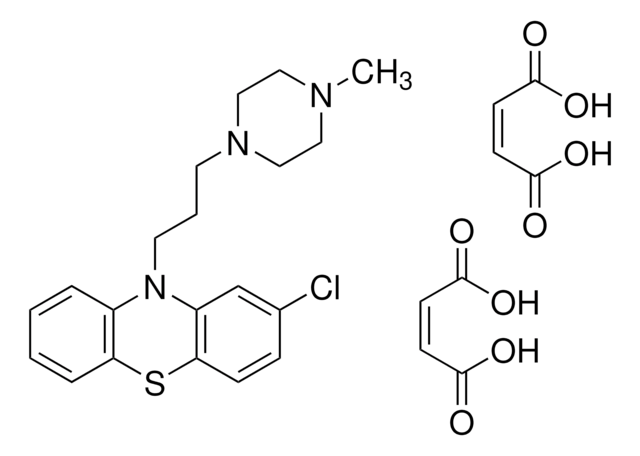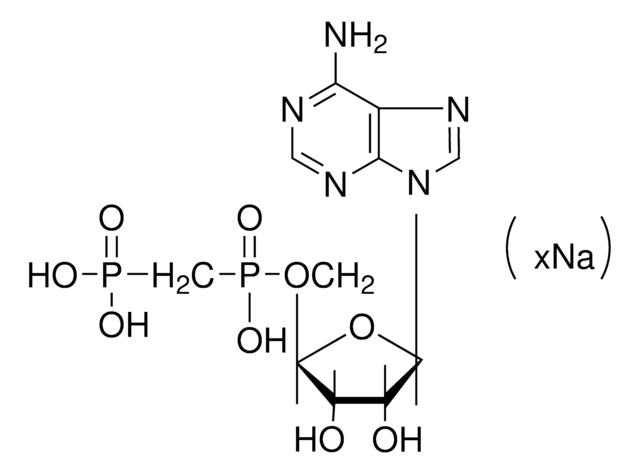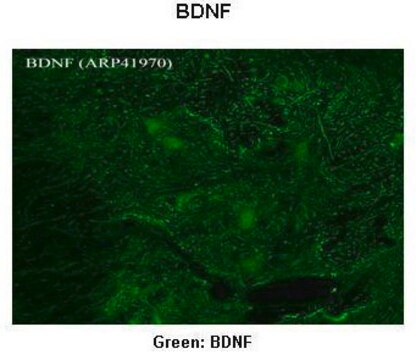T1941
Anti-TrkB antibody produced in goat
affinity isolated antibody, lyophilized powder
Synonym(s):
Anti-DEE58, Anti-EIEE58, Anti-GP145-TrkB, Anti-OBHD, Anti-TRKB, Anti-trk-B
Sign Into View Organizational & Contract Pricing
All Photos(1)
About This Item
conjugate:
unconjugated
application:
FACS
WB
WB
clone:
polyclonal
species reactivity:
human
citations:
6
technique(s):
flow cytometry: 2.5 μg/mL (per 106 cells)
western blot: 0.25-0.5 μg/mL
western blot: 0.25-0.5 μg/mL
Recommended Products
biological source
goat
Quality Level
conjugate
unconjugated
antibody form
affinity isolated antibody
antibody product type
primary antibodies
clone
polyclonal
form
lyophilized powder
species reactivity
human
technique(s)
flow cytometry: 2.5 μg/mL (per 106 cells)
western blot: 0.25-0.5 μg/mL
UniProt accession no.
storage temp.
−20°C
target post-translational modification
unmodified
Gene Information
human ... NTRK2(4915)
Related Categories
General description
The antibody recognizes recombinant human TrkB. It shows no cross-reactivity with TrkC, NT-3, NT-4, BDNF and NGF-β.
Immunogen
recombinant human TrkB extracellular domain expressed in NS0 cells.
Biochem/physiol Actions
The development and maintenance of central and peripheral nervous system is controlled by a family of Trk family of neurotrophin receptors. The Trk family consists of 3 members, TrkA (NTRK1), Trk B (NTRK2) and TrkC (NTRK3). Neurotrophins have an important role in development of the nervous system and mediate the cellular effects by binding to the Trk receptors. Trk receptors reportedly play a major role in the development and behaviour of neuroblastomas and other type of cancers.
Physical form
Lyophilized from a 0.2 μm filtered solution of phosphate buffered saline containing 5% trehalose.
Disclaimer
Unless otherwise stated in our catalog or other company documentation accompanying the product(s), our products are intended for research use only and are not to be used for any other purpose, which includes but is not limited to, unauthorized commercial uses, in vitro diagnostic uses, ex vivo or in vivo therapeutic uses or any type of consumption or application to humans or animals.
Not finding the right product?
Try our Product Selector Tool.
recommended
Product No.
Description
Pricing
Storage Class Code
11 - Combustible Solids
WGK
WGK 1
Flash Point(F)
Not applicable
Flash Point(C)
Not applicable
Choose from one of the most recent versions:
Already Own This Product?
Find documentation for the products that you have recently purchased in the Document Library.
Umed Boltaev et al.
Science signaling, 10(493) (2017-08-24)
Brain-derived neurotrophic factor (BDNF) and its receptor, tropomyosin-related kinase B (TrkB), have emerged as key regulators of brain plasticity and represent disease-modifying targets for several brain disorders, including Alzheimer's disease and major depressive disorder. Because of poor pharmacokinetic properties of
M Cazorla et al.
British journal of pharmacology, 162(4), 947-960 (2010-11-03)
By interacting with trkB receptors, brain-derived neurotrophic factor (BDNF) triggers various signalling pathways responsible for neurone survival, differentiation and modulation of synaptic transmission. Numerous reports have implicated BDNF and trkB in the pathogenesis of various central nervous system affections and
Q Liu et al.
The EMBO journal, 19(8), 1827-1838 (2000-04-25)
The TEL-TRKC fusion is expressed as a consequence of t(12;15)(p13;q25), and is associated with two human cancers: congenital fibrosarcoma and acute myelogenous leukemia (AML). We report that the T/T(F) and T/T(L) fusion variants associated with congenital fibrosarcoma and AML, respectively
Cristina Tognon et al.
Cancer cell, 2(5), 367-376 (2002-11-27)
We report that human secretory breast carcinoma (SBC), a rare subtype of infiltrating ductal carcinoma, expresses the ETV6-NTRK3 gene fusion previously cloned in pediatric mesenchymal cancers. This gene fusion encodes a chimeric tyrosine kinase with potent transforming activity in fibroblasts.
Louis F Reichardt
Philosophical transactions of the Royal Society of London. Series B, Biological sciences, 361(1473), 1545-1564 (2006-08-31)
Neurotrophins are a family of closely related proteins that were identified initially as survival factors for sensory and sympathetic neurons, and have since been shown to control many aspects of survival, development and function of neurons in both the peripheral
Our team of scientists has experience in all areas of research including Life Science, Material Science, Chemical Synthesis, Chromatography, Analytical and many others.
Contact Technical Service